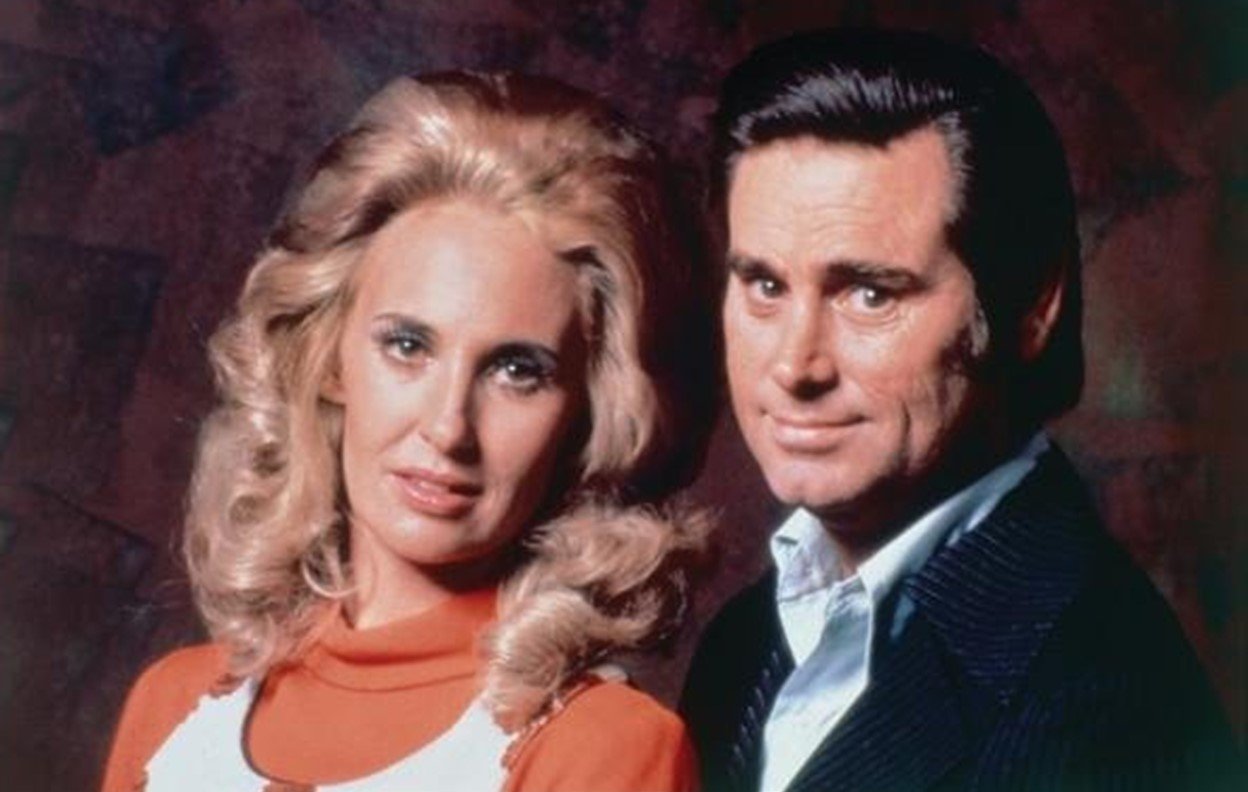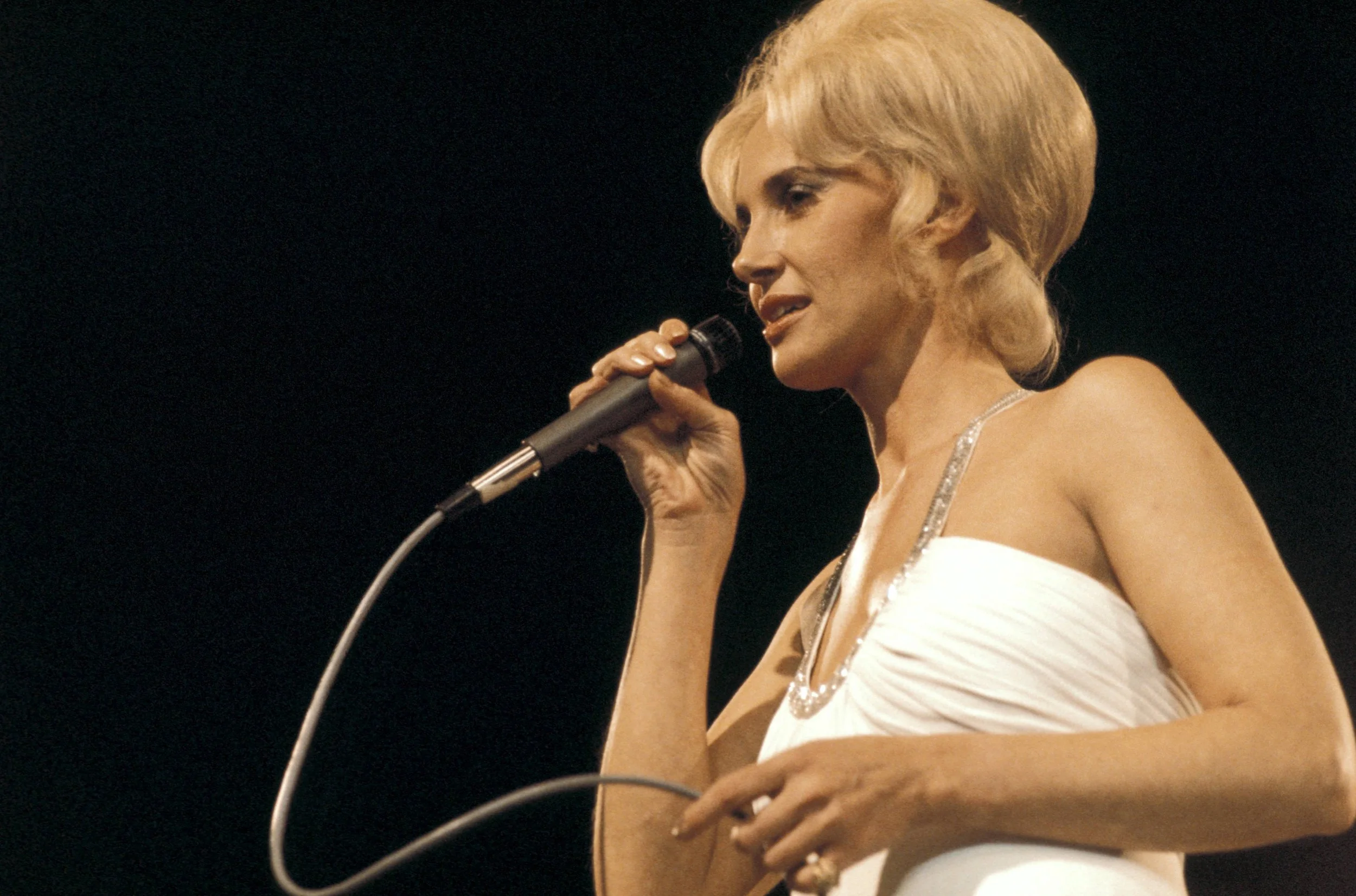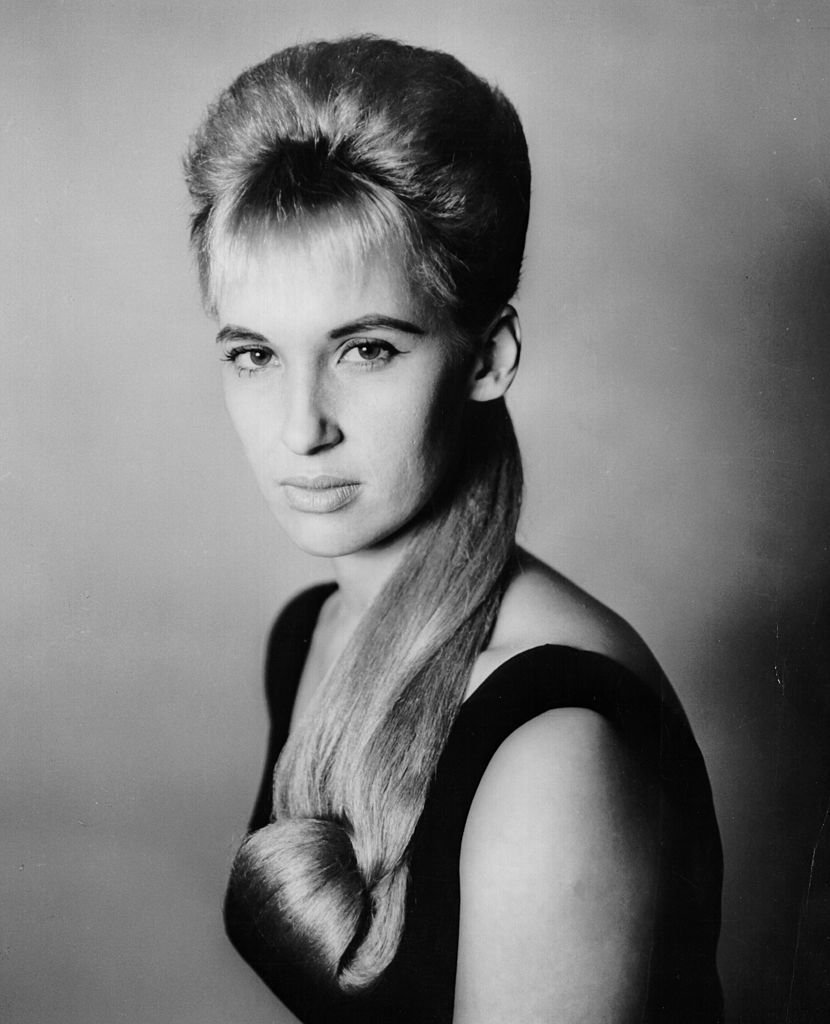Tammy Wynette
The First Lady of Country Music
Virginia Wynette Pugh, known as Tammy Wynette, was born on May 5, 1942, in Itawamba County, Mississippi (near the Alabama-Mississippi state line). Her father, William, was a farmer and musician, and her mother, Mildred, was a schoolteacher. When Virginia was nine months old, her father died from a brain tumor at the age of 26. After her father’s death, her mother moved to Memphis, Tennessee to work at a defense plant, and later remarried, and Virginia was then raised by her grandparents. Growing up, she picked cotton on her grandparents’ farm, learned how to play her father’s instruments (piano and guitar), loved listening to gospel, R&B, and country music, and played basketball. Two of her favorite singers were Hank Williams and George Jones. In elementary school, she formed a group with two friends (Wynette, Linda & Imogene) that would sing at gospel functions and a few small radio stations in Hamilton, Alabama. By the time she was thirteen, her mother was back in her life and Virginia was starting to get a little out of control and dramatic. When she was in high school, she was causing more trouble. Virginia and her mother often argued about her obsessive boy chasing ways. The only thing they did agree on was that they both loved George Jones.
In 1959, when she was 17, she married Euple Byrd and they would have three children: Gwendolyn (born in 1961), Jacquelyn “Jackie” (1962), and Tina (1965). From the beginning, the marriage was difficult, and they often struggled to get by. They moved from house to house, and both worked various jobs. At one point, they lived in a run-down cabin on her family’s farm that barely had electricity and there was no indoor plumbing or heat. In the early sixties she started going to beauty school, but soon after they moved to Memphis where they both got jobs, with Virginia working at a bar as a waitress. She started taking music a little more seriously when she started singing and earning tips while working at that Memphis bar. In 1963, they moved back to Mississippi where she was able to finish beauty school. She would continue to renew her cosmetology license even after she became a country music star. In 1964, she moved to Birmingham, Alabama and worked at a hair salon and sang on a local TV show, The Country Boy Eddie show. By 1965, Virginia had divorced Euple, recorded some demos for a Alabama DJ named Fred Lehner, and went to Nashville, Tennessee to try to get a recording contract. She also sang at a few of Porter Wagoner’s shows when he was in Birmingham. Nothing much came from those few shows or that first trip to Nashville, but she did make more trips until she moved there in early 1966. At some point she met Don Chapel, who was trying to make his mark as a songwriter. After several months of whatever gigs they could get, pitching songs, and going from record label to record label, Don had an opportunity to pitch songs to George Jones. Don brought Virginia along to meet George, but she was met with disappointment. George liked one of the songs Don sang him but totally ignored Virginia. After that meeting, Don was able to get a publishing deal and after many weeks, Virginia met with producer Billy Sherrill at Epic Records and finally got a recording contract. She would stay at Epic until 1995.
After a couple of weeks, Virginia went into the studio to record her debut single, “Apartment #9” (1966), which went to number 44 on the Country charts and at the suggestion of Billy Sherrill, took on the stage name Tammy Wynette. Tammy’s debut album, Your Good Girl’s Gonna Go Bad, was released in May 1967. It went to number 7 on the charts with the second single from the album, “Your Good Girl’s Gonna Go Bad”, going to number 3. My favorite songs from this album are “Apartment #9”, “Don’t Touch Me”, “Send Me No Roses”, and “Almost Persuaded”. That same year she married Don Chapel, who had three children of his own, but it was another troubled marriage. Beginning with her first album, many of the songs she recorded would mix Tammy’s personal and public life together. A lot of those songs were written/co-written by Billy Sherrill, Earl “Peanutt” Montgomery, and George Richey, with a few by Tammy and George Jones. The next three singles released would go to number one: “My Elusive Dreams” (with David Houston, 1966) from the duet album, My Elusive Dreams (1967), and two from Take Me to Your World/I Don’t Wanna Play House (1968), “I Don’t Wanna Play House” (winning her a Grammy award for Best Female Country Vocal Performance, 1967) and “Take Me to Your World” (1967). Take Me to Your World/I Don’t Wanna Play House would begin a trend of high charting singles, with albums doing fairly well, for Tammy until the 1980’s. After “My Elusive Dreams” became a hit, Tammy went on tour with David Houston, Don Chapel, and George Jones. During the tour, Tammy would sing duet songs with George instead of David or Don and would spend more and more time with George. Three more albums were released in the 1960’s: D-I-V-O-R-C-E (which became her first number album, 1968), Stand by Your Man (1969), and Inspiration (1969). My favorite songs from these albums are “D-I-V-O-R-C-E”, “The Legend of Bonnie & Clyde”, and “Stand by Your Man” (which won her another Grammy). In 1969, Tammy became a member of the Grand Ole Opry, had her first certified gold album (Tammy’s Greatest Hits), and by 1970 had won multiple awards and was nicknamed the First Lady of Country Music. In 1968 she divorced Don Chapel and married her idol and favorite country singer, George Jones, on February 19, 1969. Not long after they married, they moved to Lakeland, Florida where they would open a music venue on their property called Old Plantation Music Park. By 1973, they would move back to Nashville. Tammy and George would have one child together, Tamala Georgette (born in 1970).
Throughout the 1970’s, Tammy released seventeen solo albums and seven duet albums with George. My favorites are “Still Around” (The Ways to Love a Man, 1970), “It Came Upon a Midnight Clear” (Christmas with Tammy, 1970), “Take Me” (with George, We Go Together, 1971), “’Til I Get It Right” (My Man, 1972), “A Lovely Place to Cry” and “The Ceremony” (with George, Me and the First Lady, 1972), “We’re Gonna Hold On” and “(We’re Not) The Jet Set” (with George, We’re Gonna Hold On, 1973), “Satin Sheets” (Another Lonely Song, 1974), “Your Memory’s Gone to Rest” (I Still Believe in Fairy Tales, 1975), “Golden Ring” and “Near You” (with George, Golden Ring, 1976), “One of These Days” and “Dixieland (You Will Never Die)” (You and Me, 1976), and “Southern California” (with George, Greatest Hits, 1977). By the time she married George, her life was a full-blown soap opera with many controversies, with most of them her doing. There were many inconsistencies in her stories and what she portrayed herself as to her fans. Unlike her first two marriages, this one and future ones would continuously be in the headlines. In 1971, Tammy and George released their first duet album, We Go Together, which went to number three on the country charts. The two would become one of the most popular duos in country music. Their duet albums had many hit singles and fan favorites such as their first number one, “We’re Gonna Hold On”, and “The Ceremony”, “Take Me”, “Golden Ring”, “Near You” and “Southern California”. They only had one album to go to number one, Golden Ring (1976), and one that was certified gold, Greatest Hits (1977). Throughout their marriage, there were several problems such as George’s drinking and disappearing acts, and Tammy’s dramatic, and often violent, moments and dependance to various pills. Tammy filed for divorce twice, the first time in 1973 to try to get George to stop drinking, and the second in 1975 for real. They would record three more duet albums after their divorce: Golden Ring (1976), Together Again (1980), and One (1995). The last hit single they would have together would be “Two Story House” (Together Again, 1980). After their divorce, they would still do shows together here and there. In 1994, Tammy and George would re-record “Golden Ring” for George’s album The Bradley Barn Sessions. They also recorded “Lovin’ You, Lovin’ Me” the same year, but it wouldn’t be released until 2008 with George’s Burn Your Playhouse Down-The Unreleased Duets album. Tammy would have success throughout the rest of the 1970’s including two number one singles in 1976, “’Til I Can Make It on My Own” and “You and Me”. In 1976, she married Michael Tomlin after knowing each other for a few weeks, but the marriage was annulled after six weeks. In July 1978, she married her fifth and last husband, George Richey, who she had known for several years. George would also become her manager and took full control over everything in Tammy’s personal life and career. This marriage, as her close friends and family would suggest, would be her worst. One of her biggest controversies happened in October 1978 where she was supposably kidnapped at a shopping center in Nashville. Her daughters Jackie and Georgette think that this incident was a cover up for George Richey’s abusive behavior. By the late 1970’s, her addiction to pills, multiple surgeries, and exhausting tours led to life-threatening moments and multiple health issues that she would have for the rest of her life. In 1979, she published her autobiography, Stand By Your Man: An Autobiography with Joan Dew, which may have led to the downfall in her career.
The 1980’s began Tammy’s decline in hit albums and singles, with only two singles making the top ten country charts, “Another Chance” (1982) and “Sometimes When We Touch” (with Mark Gray, 1985). In 1981, a made-for-TV movie (Stand by Your Man) based on Tammy’s book came out with many negative reviews. It’s a typical country music star movie, mostly fiction than fact, but still a good watch. From 1986 to ’87, she appeared in her first acting role on the soap opera Capital as Darlene Stankowski. By the mid-1980’s she was touring non-stop and was usually a mess during shows, mumbling and forgetting lyrics, and had to sit on a stool for most shows. In 1986, Tammy went to rehab at the Betty Ford Center twice, but sadly never kicked her addiction. Eight albums were released in the 1980’s. Higher Ground (1987) is her best album from this time, it has a more simple and laid-back country sound. These are my favorite songs from two of the albums: "You Can Lead a Heart to Love (But You Can't Make It Fall)" and “Between Twenty-Nine and Danger” (Sometimes When We Touch, 1985), “There’s No Heart So Strong”, “All Through Throwing Good Love After Bad”, and “Beneath a Painted Sky” (Higher Ground, 1987). In 1990, Tammy was featured on Randy Travis’s album Heroes & Friends (“We’re Strangers Again”). She released one solo album, Heart Over Mind (1990), and a duet album, Without Walls (1994), and was on the hit duet album with Dolly Parton and Loretta Lynn (Honky Tonk Angels, 1993) that saw her in the top ten charts for the last time. By the 1990’s, her health was getting worse and she couldn’t make every show, but George Richey still expected her to tour. Tammy and George’s marriage was at its worst during this time. She published her second book, Tammy Wynette’s Southern Cookbook, in 1990. In 1991, she received the Living Legend award and was featured on the hit dance song “Justified & Ancient (Stand by the JAMS)” by British band The KLF, which helped her to expand her audience. In 1993, she was inducted into the Alabama Music Hall of Fame and received the Award for Merit from the American Music Awards in 1996. In March 1998, Tammy played her last concert and on April 6, 1998, Tammy Wynette sadly died at the age of 55 in her home in Nashville. Three days later, a public memorial service was held at the Ryman Auditorium. After her death Tammy was inducted into the Country Music Hall of Fame in 1998, awarded the Pioneer Award from the Academy of Country Music in 2003, inducted into the Nashville Songwriters Hall of Fame in 2009, and in 2010, part of Mississippi Highway 23 in her home county (Itawamba County, Mississippi) was named The Tammy Wynette Memorial Highway.
“No other female country singer conveyed the emotion of heartbreak like Tammy Wynette. She endeared herself to millions by singing about topics of everyday life – divorce, loneliness, parenting, passion. Her tearful singing style was the voice of every heartbreak a woman has ever known. Perhaps it’s that Tammy herself lived through such tumultuous times that she could convey the emotion of such weighty topics.” (https://tammywynette.com).
I highly recommend listening to season two of the podcast Cocaine & Rhinestones, it’s the best resource on George Jones and Tammy Wynette.
Sources:
https://en.wikipedia.org/wiki/Tammy_Wynette
https://en.wikipedia.org/wiki/Tammy_Wynette_albums_discography
https://en.wikipedia.org/wiki/Tammy_Wynette_singles_discography
https://en.wikipedia.org/wiki/George_Jones_and_Tammy_Wynette_discography
https://cocaineandrhinestones.com/virginia-wynette-pugh
https://cocaineandrhinestones.com/stand-by-your-man
https://cocaineandrhinestones.com/george-jones-tammy-wynette
https://cocaineandrhinestones.com/tammy-wynette
https://cocaineandrhinestones.com/tammy-wynette-george-richey
https://tammywynette.com/about/
https://www.countryliving.com/life/entertainment/a44810/tragic-life-of-tammy-wynette/
https://www.countrymusichalloffame.org/hall-of-fame/tammy-wynette



